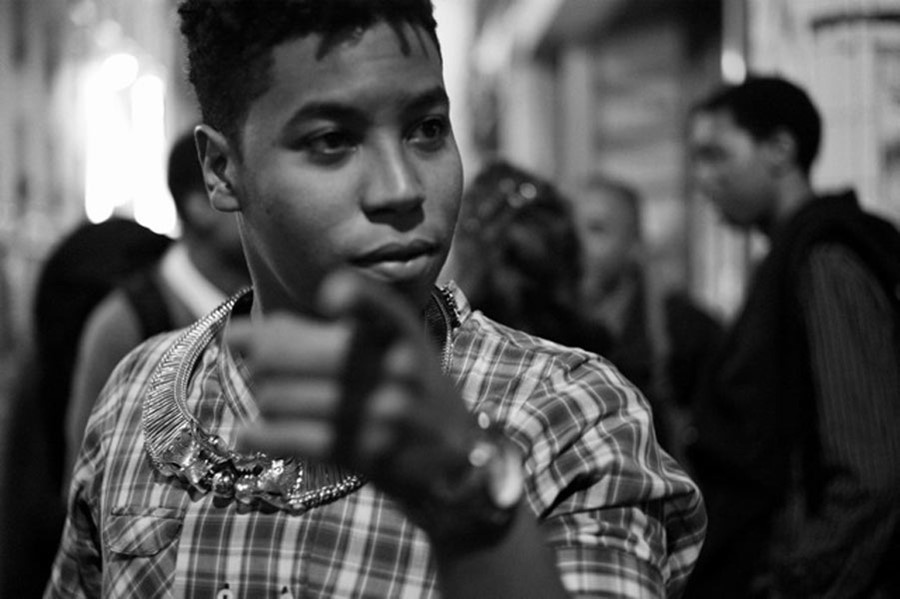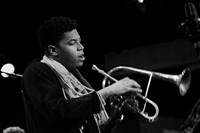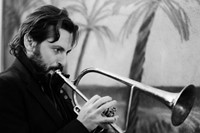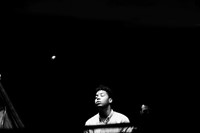The lauded experimental jazz musician Christian Scott has a modus operandi as unusual as the horns he blows...
The lauded experimental jazz musician Christian Scott has a modus operandi as unusual as the horns he blows, strange hybrid instruments that act as a sonic expression of his individuality. The sound the Grammy-nominated artist achieves on his newly released 23-track album Christian aTunde Adjuah confirms him as a genuine trans-medium pioneer, melding diverse musical forms in a genuinely shamanic brew of singular vision. “The great thing about this music is that it’s riddled with different perspectives,” he explains of the form he refers to as “stretch” music. “I’m trying to find new conduits in sound. I have studied 2,000 years of western harmony to try and figure out another voicing or another chord that can be used to force improvisational musicians to question where they are going before they deliver a musical verdict.
Perhaps unsurprisingly, every explosive performance by the Scott and his band keeps the listener guessing as to what comes next. “What I love about Christian is that he's a renegade. He's constantly taking risks and perpetually looking forward,” says his friend the photographer Asa Mader, whose images appear in this gallery for AnOther. “People think jazz is dead but he's made it nearly a personal mission to prove them wrong. To show them that jazz is not only alive, but fiercely kicking and screaming.” Here the celebrated maverick and favourite of Radiohead talks to AnOther about his New Orleans heritage, his desire for transcendence and his conceptual journeys into sound.
What made you want to be a pioneer in the jazz form?
It just comes from what happens culturally in New Orleans. New Orleans is a place where people are deliberately undereducated so that they can be a labour class – the economy there is tourism and one of the only outlets that black males have traditionally been allowed is to play jazz music, y’know? I grew up in a culture where the section leader in a band is more popular than the quarterback in a football field, because the girls know that if a guy is good at the trumpet he may have a chance of getting out of that experience!
How would you describe your sound?
Well, this new album and the last album are, in my opinion, the first stretch music records, and a vast majority of the music is written as a form of catharsis, because I was going through a lot of different things and challenges – trying to figure out my identity politics, based not only on how I feel, but also from excavating my family history and learning more about the black Indian tradition in my family; my grandfather was the only black guy to be the chief of four different tribes. This record was really about learning that history and lineage, and in musical terms that can be really hard. Stretch is really a fusion form that tries to incorporate musical forms that existed hundreds of years ago, so I had to learn about Afro-Cuban music and music from Ghana and Senegal and mix those rhythms with musical palettes that are very American. There is a piece of Africa, a piece of Native American tradition, a little classic Americana – to fuse all of that is incredibly difficult work.
"People think jazz is dead but Christian's made it nearly a personal mission to prove them wrong"
How did you go about making that journey?
I tried to figure out another musical conduit. There are two things that happened at the turn of the last century that created jazz and blues and spawned this whole thing – the first was the use of the dominant seventh chord as a consonance and a dissonance in harmony, so both as a home and something that transposes and transcends (this was also something done by Monteverdi in Western classical music, but not a lot). What the New Orleans musicians did with that was to mix a major cell and a minor cell, so if you think historically of a major chord sounding triumphant and a minor chord sounding sad or sullen, when you mix them both you get sad and triumphant – the blues. As a fusionist I realised that musicians at the beginning of the 21st century are starting to think in this way again, of making new conduits in sound, and I felt I had to find something new. I came up with a “forecasting cell”, which is basically a mixed intention cell or chord that is a complete hybrid of a consonance and a dissonance, and what that does when you are improvising is lead you to where you are supposed to go.
Is that something that is reflected in your hybrid horn?
My main horn is a hybrid of a flugelhorn a coronet and a trumpet but that’s really because, for me, each instrument to me had a different voice and I liked them all, but I didn’t like any one of them singularly. (Laughs) To be honest with you I hate the trumpet! I absolutely hate the instrument, I wanted to be a sax player but my uncle is a famous sax player called Donald Harrison, who played with Miles and all those guys. When I first started playing music he was the coolest guy on the planet to me, and I realised if I was going to hang out with him and play that I couldn’t play his instrument. I had to find a complementary instrument.
What have you learned in your explorations into fusion?
It reflects what I’ve learned in my life, in that my perspective on my experiences is not always the best or only perspective at any given moment, so how could it be right musically all of the time? I have had conversations with people about experiences I have had in life, and I may have a feeling or sentiment about them, but then I hear another side of it from someone who has never lived through the same things culturally, the things they have to say are often really profound. I’ve tried to get away from that singularity. I’ve tried to be the best example of myself I can be, constantly challenging myself and bettering myself and I think that people have maybe come to recognise that in my music. Hopefully they can hear that my ideas are constantly evolving. The willingness to accept that change is what makes someone be a great artist. There is no such thing as being right or the best – the best player is always the best player in the moment.
Do you seek transcendence when you perform?
Sure, of course. I mean, each guy on the bandstand has a different example of what that is, but I think we all aspire to connect to people on a level that you can’t see – something that is not tangible; something metaphysical… I think it’s particularly true in jazz because it can be a very hard lifestyle to play music that isn’t really appreciated where you are from, one that have to go abroad to make a living from. And it’s because of that fact that the guys that play jazz are the ones that really need to play it – it’s about channelling a certain type of energy, and perhaps it’s more about freedom than some other musical forms. In New Orleans jazz is the music of the people that don’t have food to eat; the music of the street; of the people that need music. It’s a really captivating form and it can always help people transition through the hardship of their experiences.
Christian aTunde Adjuah by Christian Scott is available now.
Text by John-Paul Pryor



